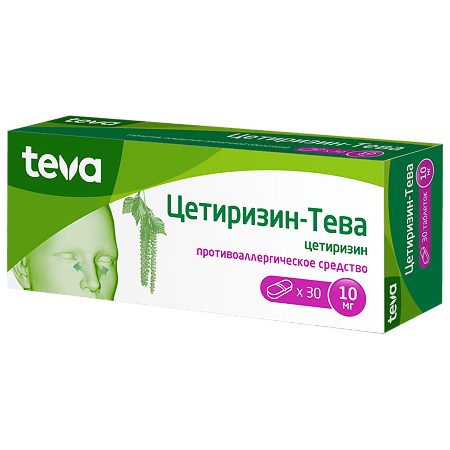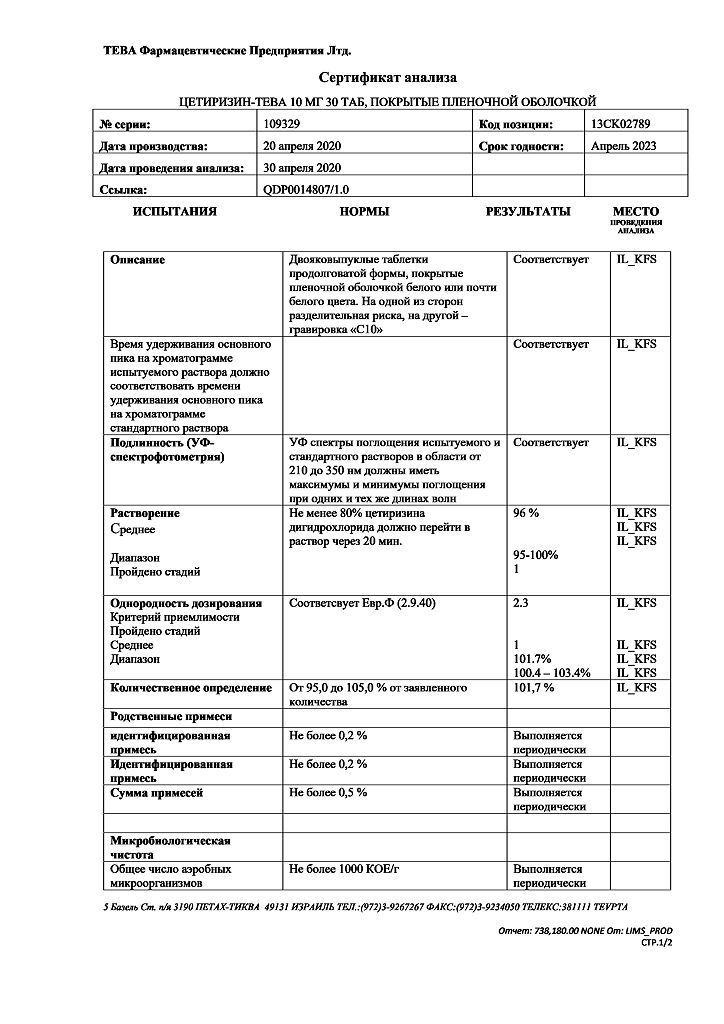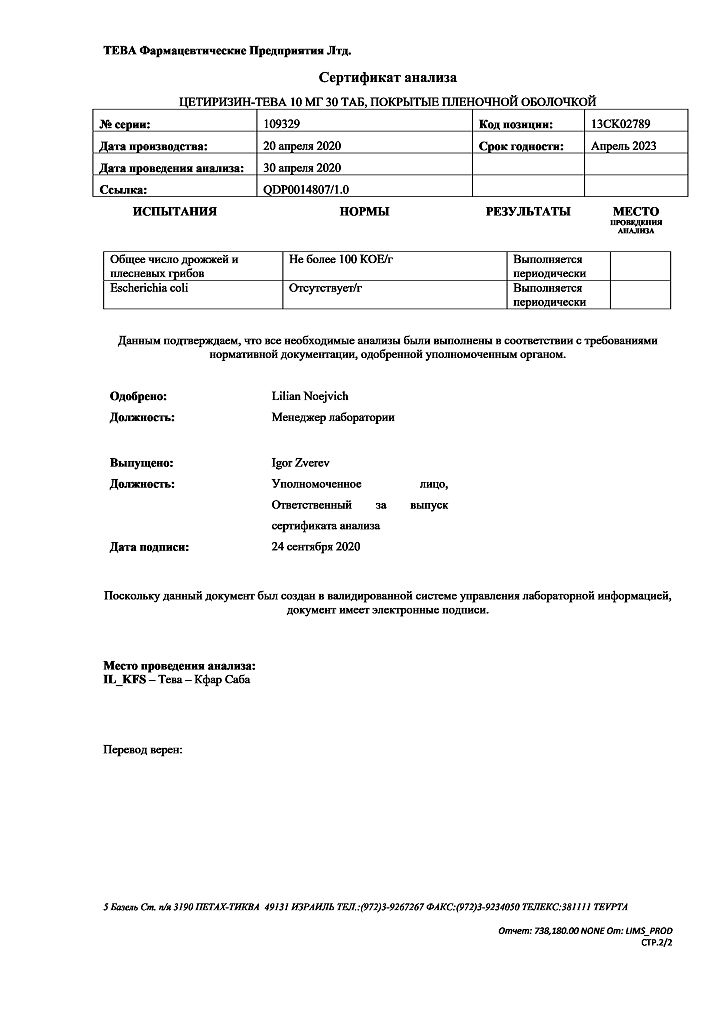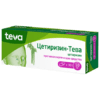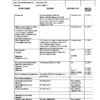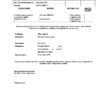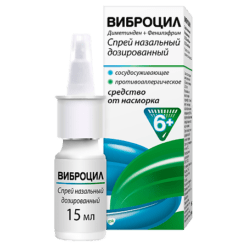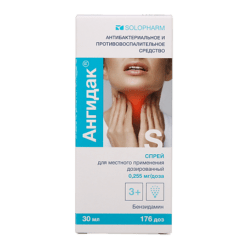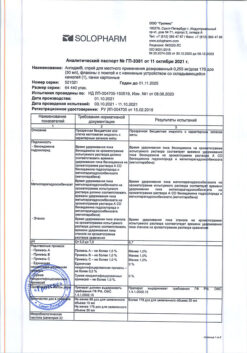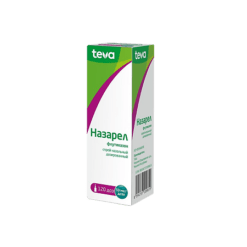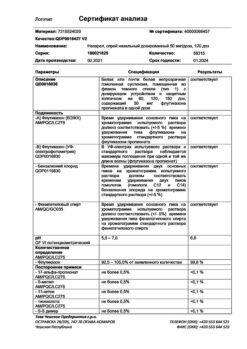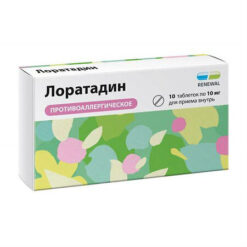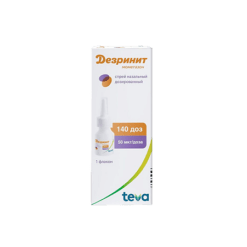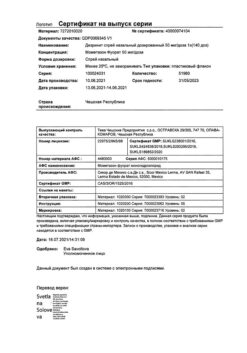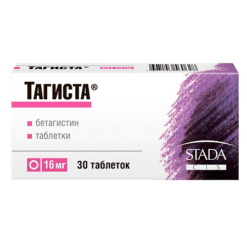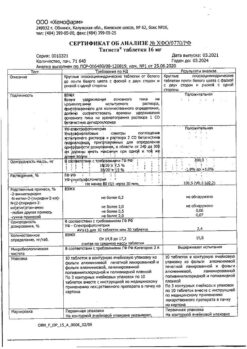No products in the cart.
Cetirizine-Teva, 10 mg 30 pcs
€6.00 €5.00
Description
Pharmacotherapeutic group: anti-allergic agent H1-histamine receptor blocker
The ATX code: R06AE07
Pharmacological properties
Pharmacodynamics
Cetirizine is a metabolite of hydroxyzine, belongs to the group of competitive histamine antagonists and blocks H1-histamine receptors.
In addition to its antihistamine effect, cetirizine prevents and relieves allergic reactions: in a dose of 10 mg once or twice daily, it inhibits the late phase of eosinophil aggregation in the skin and conjunctiva of patients with allergic reactions.
Clinical efficacy and safety. Studies in healthy volunteers have shown that cetirizine at doses of 5 or 10 mg significantly inhibits rash and redness reactions to high concentrations of histamine injected into the skin, but no correlation with efficacy has been established.
In a 6-week placebo-controlled study involving 186 patients with allergic rhinitis and concomitant mild to moderate bronchial asthma, cetirizine once daily at a dose of 10 mg was shown to reduce rhinitis symptoms and not affect lung function.
The results of this study confirm the safety of cetirizine in patients with allergies and mild to moderate bronchial asthma.
A placebo-controlled study showed that administration of cetirizine at a dose of 60 mg daily for 7 days did not cause clinically significant prolongation of the QT interval.
The administration of cetirizine at the recommended dose was shown to improve quality of life in patients with year-round and seasonal allergic rhinitis.
Children. A 35-day study involving patients aged 5-12 years showed no evidence of insensitivity to the antihistamine effect of cetirizine. Normal skin response to histamine was restored within three days of drug withdrawal with repeated use.
Pharmacokinetics
The pharmacokinetic parameters of cetirizine change linearly when used in doses from 5 to 60 mg.
Extraction. Maximum plasma concentration is reached after 1±0.5 hours and is 300 ng/ml.
The various pharmacokinetic parameters such as maximum plasma concentration (Cmax) and area under the concentration-time curve (AUC) are uniform.
Eating does not affect the completeness of cetirizine absorption, although its rate is reduced. The bioavailability of different dosage forms of cetirizine (solution, capsules, tablets) is comparable.
Distribution. Cetirizine is 93±0.3% bound to blood plasma proteins. The apparent volume of distribution (Vd) is 0.5 l/kg. Cetirizine has no effect on warfarin binding to proteins.
Metabolism. Cetirizine does not undergo extensive primary metabolism.
Elimation. The elimination half-life (T1/2) is approximately 10 hours.
There was no cetirizine cumulation when the drug was taken in a daily dose of 10 mg for 10 days.
Approximately 2/3 of the dose taken is excreted unchanged in the urine.
Elderly patients. In 16 elderly persons, the T1/2 was 50% higher and clearance was 40% lower at a single dose of 10 mg compared with non-elderly persons.
The decreased clearance of cetirizine in elderly patients is probably due to decreased renal function in this patient population.
Patients with renal impairment. In patients with mild renal impairment (creatinine clearance (CK) > 40 ml/min), pharmacokinetic parameters are similar to those in healthy volunteers with normal renal function.
In patients with moderate renal impairment and in patients on hemodialysis (CK < 7 ml/min), the T1/2 prolongs by 3 times and total clearance decreases by 70% relative to healthy volunteers with normal renal function when taking the drug orally in 10 mg dose.
In patients with moderate to severe renal impairment, an appropriate change in dosing regimen is required. Cetirizine is practically not eliminated from the body by hemodialysis.
Patients with hepatic impairment. In patients with chronic liver disease (hepatocellular, cholestatic, and biliary cirrhosis), a single dose of 10 or 20 mg increases T1/2 by approximately 50% and decreases clearance by 40% compared to healthy subjects. Dose adjustment is necessary only if the patient with hepatic impairment also has concomitant renal impairment.
Children. T1/2 in children 6 to 12 years old is 6 hours, 2 to 6 years old is 5 hours, 6 months to 2 years old is reduced to 3.1 hours.
Indications
Indications
Cetirizine dihydrochloride is indicated for use in adults and children 6 years of age and older to relieve:
• nasal and ocular symptoms of year-round (persistent) and seasonal (intermittent) allergic rhinitis and allergic conjunctivitis: itching, sneezing, nasal congestion, rhinorrhea, lacrimation, conjunctival hyperemia;
• symptoms of chronic idiopathic urticaria.
Pharmacological effect
Pharmacological effect
Pharmacotherapeutic group: antiallergic H1-histamine receptor blocker
ATX code: R06AE07
Pharmacological properties
Pharmacodynamics
Cetirizine is a metabolite of hydroxyzine, belongs to the group of competitive histamine antagonists and blocks H1-histamine receptors.
In addition to the antihistamine effect, cetirizine prevents the development and alleviates the course of allergic reactions: at a dose of 10 mg once or twice a day, it inhibits the late phase of eosinophil aggregation in the skin and conjunctiva of patients with allergic reactions.
Clinical efficacy and safety. Studies in healthy volunteers have shown that cetirizine at doses of 5 or 10 mg significantly inhibits the rash and redness response to high concentrations of histamine in the skin, but the correlation with efficacy has not been established.
A 6-week placebo-controlled study involving 186 patients with allergic rhinitis and concomitant mild to moderate asthma showed that cetirizine 10 mg once daily reduced rhinitis symptoms and did not affect pulmonary function.
The results of this study confirm the safety of cetirizine in patients suffering from allergies and mild to moderate bronchial asthma.
A placebo-controlled study showed that taking cetirizine at a dose of 60 mg per day for 7 days did not cause a clinically significant prolongation of the QT interval.
Taking cetirizine at the recommended dose showed an improvement in the quality of life of patients with year-round and seasonal allergic rhinitis.
Children. In a 35-day study in patients aged 5-12 years, there was no evidence of resistance to the antihistamine effect of cetirizine. The normal skin reaction to histamine was restored within three days after discontinuation of the drug with repeated use.
Pharmacokinetics
The pharmacokinetic parameters of cetirizine when used in doses from 5 to 60 mg change linearly.
Suction. The maximum concentration in blood plasma is reached after 1±0.5 hours and is 300 ng/ml.
Various pharmacokinetic parameters, such as maximum plasma concentration (Cmax) and area under the concentration-time curve (AUC), are homogeneous.
Food intake does not affect the complete absorption of cetirizine, although its rate decreases. The bioavailability of various dosage forms of cetirizine (solution, capsules, tablets) is comparable.
Distribution. Cetirizine is 93±0.3% bound to plasma proteins. The apparent volume of distribution (Vd) is 0.5 l/kg. Cetirizine does not affect the protein binding of warfarin.
Metabolism. Cetirizine does not undergo extensive first-pass metabolism.
Excretion. The half-life (T1/2) is approximately 10 hours.
When taking the drug at a daily dose of 10 mg for 10 days, no accumulation of cetirizine was observed.
Approximately 2/3 of the dose taken is excreted unchanged in the urine.
Elderly patients. In 16 elderly individuals, with a single dose of 10 mg of the drug, T1/2 was 50% higher, and clearance was 40% lower compared to non-elderly individuals.
The decreased clearance of cetirizine in elderly patients is likely due to decreased renal function in this category of patients.
Patients with renal failure. In patients with mild renal failure (creatinine clearance (CC) > 40 ml/min), pharmacokinetic parameters are similar to those in healthy volunteers with normal renal function.
In patients with moderate renal failure and in patients on hemodialysis (creatinine clearance <7 ml/min), when taking the drug orally at a dose of 10 mg, T1/2 is extended by 3 times, and total clearance is reduced by 70% relative to healthy volunteers with normal renal function.
For patients with moderate or severe renal failure, an appropriate change in the dosage regimen is required. Cetirizine is practically not removed from the body during hemodialysis.
Patients with liver failure. In patients with chronic liver diseases (hepatocellular, cholestatic and biliary cirrhosis), with a single dose of 10 or 20 mg, T1/2 increases by approximately 50%, and clearance decreases by 40% compared to healthy subjects. Dose adjustment is only necessary if the patient with hepatic insufficiency also has concomitant renal insufficiency.
Children. T1/2 in children from 6 to 12 years is 6 hours, from 2 to 6 years – 5 hours, from 6 months to 2 years – reduced to 3.1 hours.
Special instructions
Special instructions
In patients with spinal cord injury, prostatic hyperplasia, or other predisposing factors to urinary retention, caution is required as cetirizine may increase the risk of urinary retention.
In patients with renal failure, the dosage regimen of the drug should be adjusted (see section “Dosage and Administration”).
Due to a possible decrease in renal function in elderly patients, the dosage regimen of the drug should be adjusted (see section “Dosage and Administration”).
Caution is recommended when using cetirizine concomitantly with alcohol, as cetirizine may cause increased drowsiness.
Caution should be exercised in patients with epilepsy and increased convulsive readiness.
Before prescribing allergy tests, a three-day “washing out” period is recommended due to the fact that H1-histamine receptor blockers inhibit the development of skin allergic reactions.
Cetirizine film-coated tablets should not be administered to patients with hereditary galactose intolerance, lactase deficiency or glucose-galactose malabsorption syndrome.
After stopping the use of cetirizine, itching and/or urticaria may occur, even if these symptoms were absent at the beginning of treatment. In some cases, symptoms may be severe and require resumption of cetirizine. Symptoms disappear when cetirizine is resumed.
Children. Cetirizine film-coated tablets are contraindicated in children under 6 years of age, since this dosage form does not allow the use of an appropriate dosage for this age group.
Impact on the ability to drive vehicles and machinery
An objective assessment of the ability to drive vehicles and operate machinery did not reliably reveal any adverse events when taking the drug at the recommended dose. However, for patients with symptoms of drowsiness while taking the drug, it is advisable to refrain from driving a car, engaging in potentially hazardous activities, or operating machinery that requires increased concentration and speed of psychomotor reactions.
Active ingredient
Active ingredient
Cetirizine
Composition
Composition
1 tablet contains:
active ingredient cetirizine dihydrochloride 10.00 mg;
excipients: microcrystalline cellulose (Avicel PH 102) 40.00 mg, lactose monohydrate 63.50 mg, colloidal silicon dioxide (anhydrous colloidal silicon dioxide) 0.50 mg, magnesium stearate 1.00 mg; shell Opadry OY-GM-28900 white: hypromellose (E464) 0.94 mg, polydextrose 0.94 mg, titanium dioxide (E171) 0.94 mg, macrogol-4000 (polyethylene glycol-4000) 0.18 mg.
Pregnancy
Pregnancy
Pregnancy
An analysis of prospective data from more than 700 cases of pregnancy outcomes revealed no cases of malformations, embryonic or neonatal toxicity with a clear cause-and-effect relationship.
Experimental studies on animals have not revealed any direct or indirect adverse effects of cetirizine on the developing fetus (including in the postnatal period), the course of pregnancy and childbirth.
Adequate and strictly controlled clinical studies on the safety of the drug during pregnancy have not been conducted, therefore Cetirizine-Teva should not be used during pregnancy.
Breastfeeding period
Cetirizine is excreted in breast milk in concentrations representing from 25% to 90% of the drug concentration in the blood plasma, depending on the time after administration. During breastfeeding, use after consultation with a doctor if the expected benefit to the mother outweighs the potential risk to the child.
Fertility
Available data on the effects on human fertility are limited, but no negative effects on fertility have been identified.
Contraindications
Contraindications
• Hypersensitivity to cetirizine, hydroxyzine or piperazine derivatives, as well as other components of the drug.
• End-stage renal failure (creatinine clearance < 10 ml/min).
• Children under 6 years of age (for this dosage form).
• Pregnancy.
• Hereditary galactose intolerance, lactase deficiency or glucose-galactose malabsorption syndrome.
With caution
In patients:
• with chronic renal failure (with creatinine clearance > 10 ml per minute, dosage regimen adjustment is required);
• old age (with an age-related decrease in glomerular filtration);
• with epilepsy and increased convulsive readiness;
• with predisposing factors to urinary retention (see section “Special instructions”);
• during breastfeeding.
Side Effects
Side Effects
Data obtained from clinical studies
Review
The results of clinical studies have demonstrated that the use of cetirizine in recommended doses leads to the development of minor undesirable effects on the central nervous system, including drowsiness, fatigue, dizziness and headache.
In some cases, paradoxical stimulation of the central nervous system has been reported.
Despite the fact that cetirizine is a selective blocker of peripheral
H1 receptors and has virtually no anticholinergic effect, reported
about isolated cases of difficulty urinating, disturbances of accommodation and dry mouth.
Liver dysfunction has been reported, accompanied by increased levels of liver enzymes and bilirubin. In most cases, adverse events resolved after discontinuation of cetirizine dihydrochloride.
List of adverse reactions
Data are available from double-blind, controlled clinical trials comparing cetirizine with placebo or other antihistamines administered at recommended doses (10 mg once daily for cetirizine) in more than 3200 patients from which reliable safety data can be analyzed.
According to the results of the pooled analysis, in placebo-controlled studies with the use of cetirizine at a dose of 10 mg, the following adverse reactions were identified with a frequency of 1.0% or higher:
Adverse reactions (WHO terminology)
Cetirizine 10 mg
(n =3260)
Placebo
(n = 3061)
General disorders and disorders at the injection site
Fatigue
1.63%
0.95%
Nervous system disorders
Dizziness
1.10%
0.98%
Headache
7.42%
8.07%
Gastrointestinal disorders
Abdominal pain
0.98%
1.08%
Dry mouth
2.09%
0.82%
Nausea
1.07%
1.14%
Mental disorders
Drowsiness
9.63%
5.00%
Respiratory, thoracic and mediastinal disorders
Pharyngitis
1.29%
1.34%
Although the incidence of somnolence in the cetirizine group was higher than that in the placebo group, most cases were mild or moderate in severity. When objectively assessed in other studies, it was confirmed that the use of cetirizine at the recommended daily dose in healthy young volunteers does not affect their daily activities.
Children
In placebo-controlled studies, the following adverse reactions were observed with an incidence of 1% or greater in children aged 6 months to 12 years:
Adverse reactions (WHO terminology)
Cetirizine
(n = 1656)
Placebo
(n =1294)
Gastrointestinal disorders
Diarrhea
1.0%
0.6%
Mental disorders
Drowsiness
1.8%
1.4%
Respiratory, thoracic and mediastinal disorders
Rhinitis
1.4%
1.1%
General disorders and disorders at the injection site
Fatigue
1.0%
0.3%
Post-registration experience
In addition to the adverse events identified during clinical trials and described above, the following adverse reactions were observed during post-registration use of the drug.
Adverse reactions are systematized in accordance with the World Health Organization (WHO) Classification: very common (≥1/10); often (≥1/100, <1/10); uncommon (≥1/1000, <1/100); rare (≥1/10000, <1/1000); very rare (< 1/10000); frequency unknown (cannot be determined from available data).
From the blood and lymphatic system: very rarely – thrombocytopenia.
From the immune system: rarely – hypersensitivity reactions; very rarely – anaphylactic shock.
Metabolic and eating disorders: frequency unknown – increased appetite.
Mental disorders: infrequently – agitation; rarely – aggression, confusion, depression, hallucinations, sleep disturbance; very rarely – tic; frequency unknown – suicidal ideation, sleep disturbances (including nightmares).
From the nervous system: infrequently – paresthesia; rarely – convulsions; very rarely – taste perversion, dyskinesia, dystonia, fainting, tremor; frequency unknown – memory impairment, including amnesia, deafness.
From the organ of vision: very rarely – disturbance of accommodation, blurred vision, nystagmus; frequency unknown – vasculitis.
On the part of the hearing organs: frequency unknown – vertigo.
From the cardiovascular system: rarely – tachycardia.
From the digestive system: infrequently – diarrhea.
Hepatobiliary disorders: rarely – liver failure with changes in liver function tests (increased activity of transaminases, alkaline phosphatase, gamma-glutamyltransferase and bilirubin).
On the skin: infrequently – rash, itching; rarely – urticaria; very rarely – angioedema, persistent drug erythema; frequency unknown – acute generalized exanthematous pustulosis.
From the urinary system: very rarely – dysuria, enuresis; frequency unknown – urinary retention.
General disorders: infrequently – asthenia, malaise; rarely – peripheral edema.
Research: rarely – weight gain.
Description of individual adverse reactions. Cases of itching (including intense itching) and/or urticaria have been reported following discontinuation of cetirizine use.
Adverse Reaction Alert
A system for reporting suspected adverse reactions after registration of a medicinal product is of great importance.
This allows continuous monitoring of the benefit/risk ratio of the drug.
If any of the side effects indicated in the instructions get worse, or you notice any other side effects not listed in the instructions, tell your doctor.
Interaction
Interaction
Based on the analysis of pharmacodynamics and pharmacokinetics of cetirizine, interaction with other drugs is unlikely.
No significant interactions were observed with pseudoephedrine and theophylline (at a dose of 400 mg per day) in specific drug interaction studies.
The level of absorption of cetirizine is not reduced by food intake, but the rate of absorption is reduced.
Concomitant use of cetirizine with alcohol and other drugs that depress the central nervous system may further reduce concentration and reaction speed, although cetirizine does not enhance the effect of alcohol (at a blood concentration of 0.5 g/l).
If you are using the above or other medications (including over-the-counter medications), consult your doctor before using Cetirizine-Teva.
Overdose
Overdose
Symptoms. Symptoms observed with cetirizine overdose are mainly related to effects on the central nervous system or effects indicative of anticholinergic effects.
With a single dose of 50 mg, the following symptoms were observed: confusion, diarrhea, dizziness, fatigue, headache, malaise, mydriasis, itching, anxiety, weakness, sedation, drowsiness, stupor, tachycardia, tremor, urinary retention.
Treatment. Immediately after taking the drug, gastric lavage or induction of vomiting. It is recommended to take activated carbon and carry out symptomatic and supportive therapy. There is no specific antidote. Hemodialysis is ineffective.
Storage conditions
Storage conditions
Store at a temperature not exceeding 25 °C in the original packaging to protect from light.
Keep out of the reach of children!
Shelf life
Shelf life
3 years.
Do not use after expiration date.
Manufacturer
Manufacturer
Teva Pharmaceutical Enterprises Ltd., Israel
Additional information
| Shelf life | 3 years. Do not use after the expiration date. |
|---|---|
| Conditions of storage | Store at a temperature not exceeding 25 ° C in the original package to protect it from light. Keep out of reach of children! |
| Manufacturer | Teva Pharmaceutical Enterprises Ltd, Israel |
| Medication form | pills |
| Brand | Teva Pharmaceutical Enterprises Ltd |
Related products
Buy Cetirizine-Teva, 10 mg 30 pcs with delivery to USA, UK, Europe and over 120 other countries.

